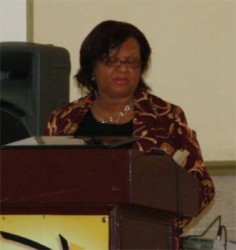After 81 years of serving as the country’s principal training institution for women in the various disciplines in the field of home-making the Carnegie School of Home Economics (CSHE) is reinventing itself to make a more central contribution to the country’s hospitality and service sector and by extension to the country’s economy.
In a sense that process has already begun with the CSHE having collaborated with much of the local hospitality sector to train staff to meet the demands of the various companies. As the service sector has expanded the demands on the institution have increased. However, the resources allocated to the CSHE have never been adequate to meet these demands.
After several years of contemplating the future of the CSHE the Government of Guyana has allocated US$4 million for the creation of a local Hospitality Institute. It is, in a sense, the elevation of the CSHE to the higher purpose of serving as a trainer and standards setter across the entire service industry.
CSHE Principal Penelope Harris says the institution looks forward to the commencement of construction of the new training institution at Turkeyen before year end. It would, she says, augment the renewed sense of purpose which is already driving the institution.

Upon completion, the new Hospitality Centre will serve to symbolize the country’s commitment to significantly raising competency levels in the service sector whilst ensuring that the tourism and hospitality sector is served by better trained, better qualified staff. At the same time it will send signals to the wider Caribbean where Guyana’s credentials in the tourism sector have long been questioned.
It is a new and significant challenge for the CSHE. Harris says that what is intended to be a theoretical and practical training institution will be run in collaboration with the University of Guyana and the Ministry of Tourism, Industry and Commerce.
She says the significance of the new Hospitality Centre reposes in its timeliness. She points out that the expansion of the hospitality and service sector continues to place increasing pressure on the limited local training facilities.
As the demand for trained workers in the service sector grows, businesses seek to outbid each other for trained staff. That has given rise to an increasing reluctance on the part of some hotels and restaurants to invest in the kinds of extended training programmers that the CSHE seeks to offer. After training, the headhunting begins and owners begin to fret over lost investments.
These days, the demand in the service sector is mostly for shorter, more focused training programmes that cover only some of the needs of those entities. The weaknesses lie in the incompleteness of the training.
The hope is that a National Hospitality Centre will bring this problem to an end. The various stakeholders—the Ministry of Education, the University of Guyana, the Ministry of Tourism, Industry and Commerce and the CSHE—will all be involved in curriculum planning and execution with education delivery focusing on a mix of theoretical and practical training including in service sector management.
Last week, in anticipation of the challenges that lie ahead the CSHE held the first of what it expects to be a series of workshops and consultative sessions to begin to fine tune preparations. Titled ‘Creating the Winning Team – 21st Century Strategies for Success in the Tourism and Hospitality Industry’ the programme sought to realize a meeting of minds amongst the stakeholders who are expected to take the initiative forward. During an earlier interview, Harris had indicated that she intended to look to trained Guyanese in the diaspora to help the CSHE accomplish its mission.
Last week’s forum was facilitated by Philippa Morrish, a United States-based Guyanese, who is a certified Social Protocol Consultant and the founder of Etiquette Training International, New York. Harris believes that accomplishing the goals which the CSHE has set itself requires the collaborative efforts of trained personnel who can bring both local and external dimensions to a new service culture. She is banking on the CSHE and the service sector as a whole securing more national attention and resources based on its accomplishments in the period ahead.
What the CSHE principal is also hoping is that local service sector trainees will benefit from attachments to regional and international entities to sharpen their skills and help them develop a better appreciation of other service cultures.
Such training as the CSHE currently does—mostly specialized short programmes for specific institutions—is delivered by a combination of internal staff, other local experts and, on occasion, personnel recruited from abroad. Harris expects that the envisaged new training regime will eradicate ad hoc approaches to recruiting trainers.
Part of the current training focus is on meeting the supervisory needs of the service sector. Harris articulates the virtues of team leadership in the service sector. The added advantage of intensive management training in the service sector is that supervisors themselves can become trainers.
Last week’s forum was attended by a range of public and private sector representatives including the Ministry of Tourism, Industry and Commerce; Regency International Hotel; Banks DIH Ltd; Arakari Resort Apartments; Clean Care International; Mackie’s Sweet Hand Restaurant; the University of Guyana and the International Convention Centre and Maggie’s Snackette. The attendance, Harris says, is an indication that more entities are beginning to take the Carnegie mission seriously. Some of the areas of training which are in demand in the service sector are Front Desk Operations, Housekeeping, Resort Management, Hospitality Management and Health and Social Care.
Nigerian-born Patrick Chinedu Onwuzirike, Assistant Chief Education Officer responsible for technical studies who addressed the forum, said the orientation of the training is consistent with the Ministry of Education’s holistic plan for the delivery of technical and vocational education.
Harris agrees though she can scarcely conceal her enthusiasm for the new adventure on which the CSHE is about to embark.





